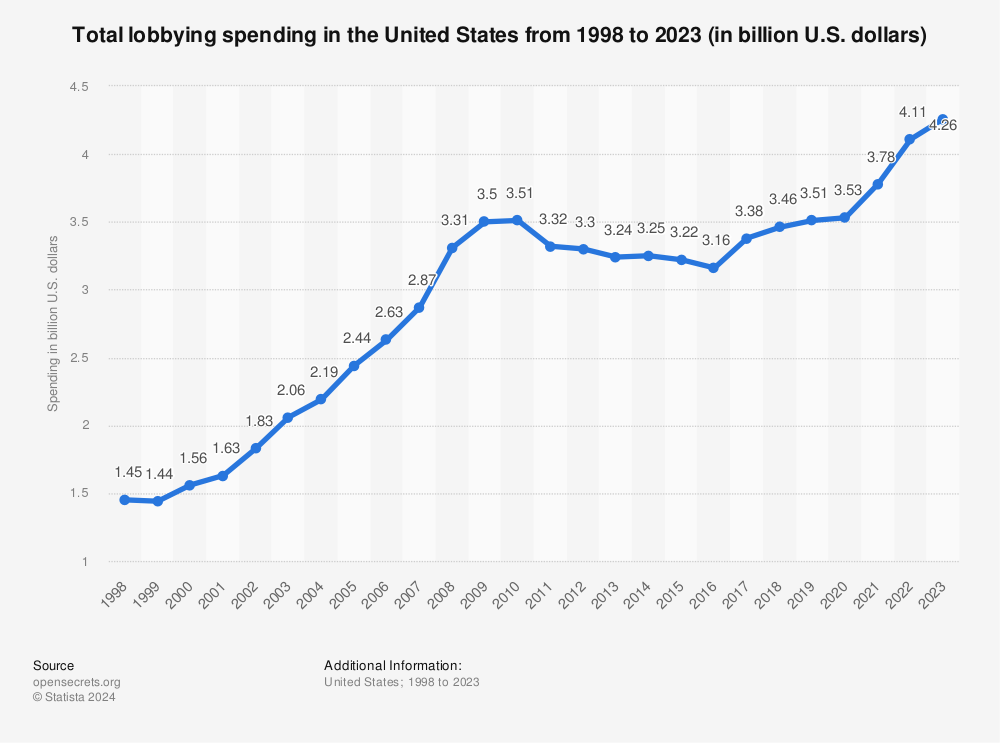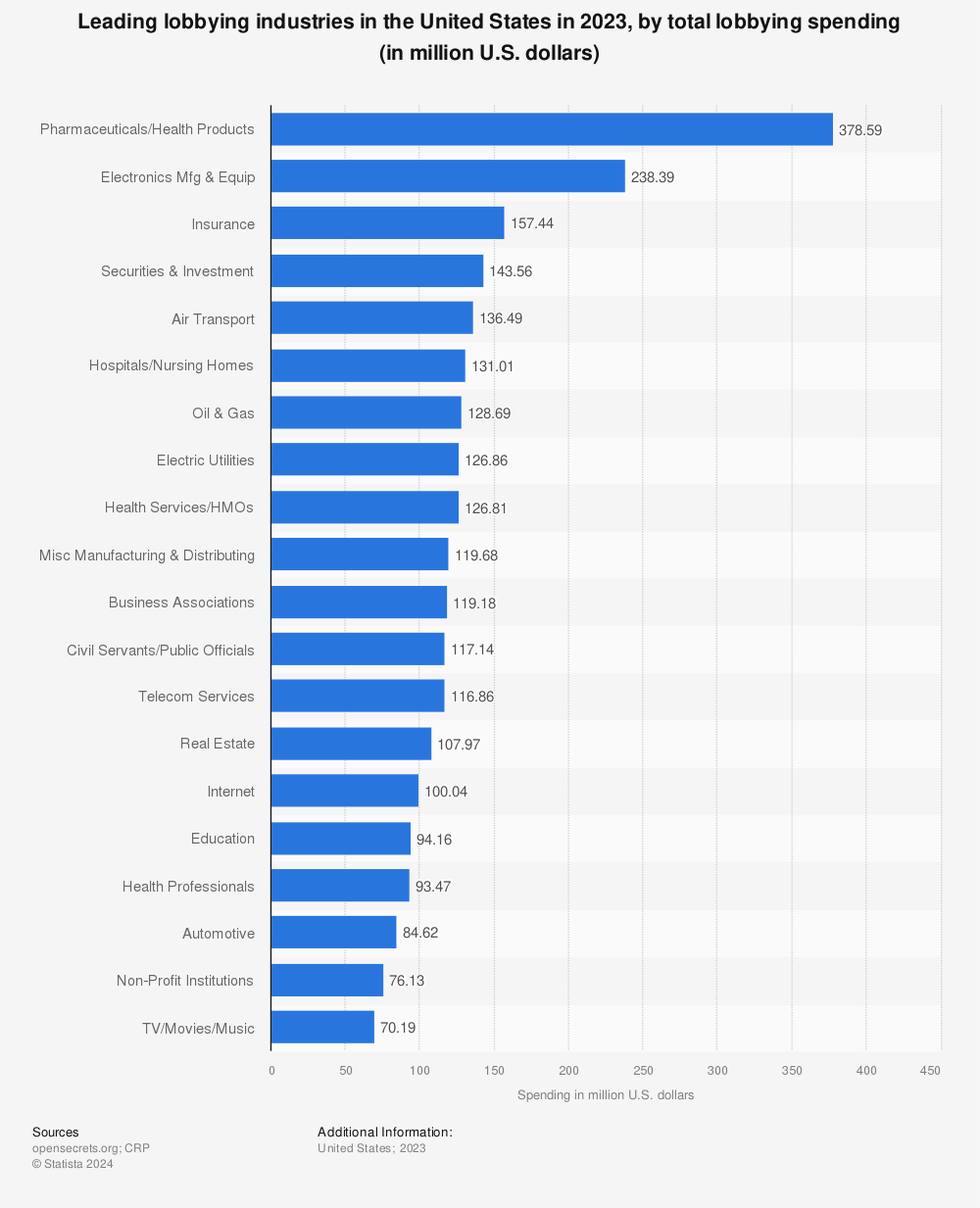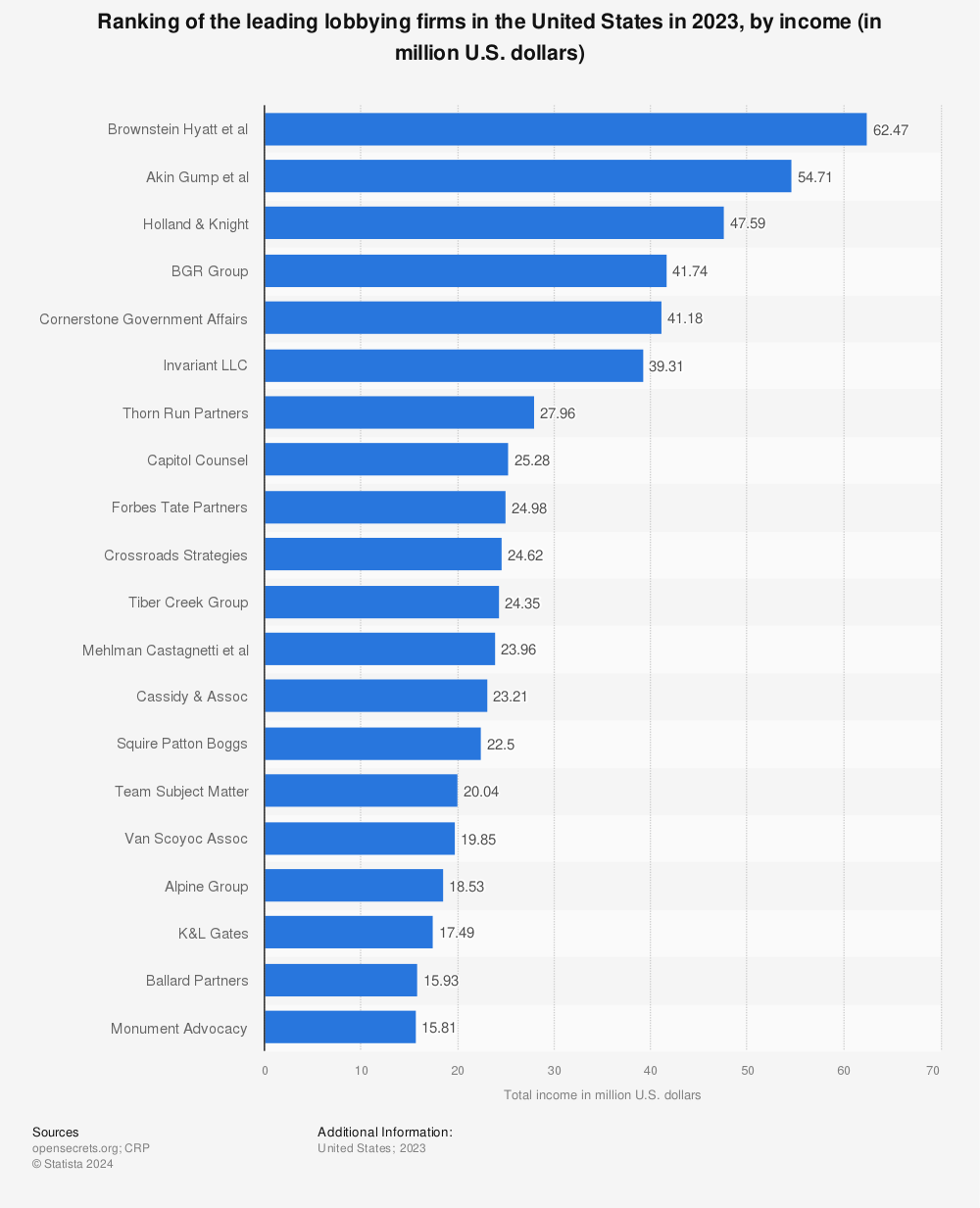Lobbying laws, incidentally, have their origin in a President’s evening drinking habits.
The term ‘lobbyist’ allegedly became famous in the US thanks to President Ulysses S. Grant. One anecdote relates that Grant would regularly slip out of the White House and visit the lounge at the nearby Willard Hotel in downtown Washington, D.C., for an evening drink.
Grant’s visits to the Willard Hotel soon became common knowledge. Those wishing to petition their causes would collect in the hotel lobby to corner Grant as he came and went to the lounge.
Frustrated by the ever-growing crowd, Grant frequently complained about the “lobbyists” who would get in his way. Things have changed plenty from his day.
Today lobbying is well known as the process of petitioning the government to influence policy. The amounts of money spent on this are eye-watering, to say the least. In 2021, the total lobbying spending in the United States amounted to $3.78 billion. In 2022, the total lobbying spending was around $4 billion.


Find more statistics at Statista
Is lobbying illegal or bribery?
The United States forthrightly acknowledges that lobbying is a legitimate activity, that free and open access to government is important, and that the system of registration should not impede that access.
Lobbying regulation from the United States perspective is designed largely to enhance transparency, reduce corruption in the policymaking process and promote public accountability of decision-makers.
The idea is that people have a fundamental right to petition their government – a right enshrined in the US Constitution’s First Amendment. And public officials have a right to know who is trying to influence them and for what.
Any citizen, interest group, or firm can lobby. It is an open playground. This is why lobbying is not bribery. Bribery is where one person seeks a special favor to the exclusion of all others. Lobbying is openly petitioning decision-makers and making a case for your cause. And you have the right to do so, just like everyone else, under the same regulations that everyone has to follow.
Not that this has improved the public perception of lobbyists. In a Gallup Poll from April 2011, 71 percent of respondents complained that lobbyists had “too much power” compared to 13 percent who said their power was “about right” and 8 percent who said they did not have enough.


The federal government’s main method of regulating lobbyists is to require that lobbyists disclose their contact information, their client’s information, and the specific bill numbers and executive branch actions on which they lobbied.
But this simple explanation covers decades of laws and amendments and only partially covers hundreds of state-specific regulations. To know how lobbying laws work in the US, we will have a look at the following:
- Federal lobbying laws
- State lobbying laws
- Local and municipal lobbying Laws
- Ethics laws
“The purpose of our lobbying laws is to tell the public who is being paid how much to lobby whom on what.”
– Senator Carl Levin
Federal lobbying laws
1. Federal Regulation of Lobbying Act of 1946
The Federal Regulation of Lobbying Act of 1946 was passed to provide information to members of Congress about the lobbyists in Washington, D.C. It was the first overarching law to regulate lobbying, though several patchwork laws did govern specific aspects of lobbying before.
This lobbying law sought to legally define a lobbyist for the first time. It called a lobbyist someone who –
“…receives money or any other thing of value to be used principally to aid in the accomplishment of any of the following purposes:
(a) The passage or defeat of any legislation by the Congress of the United States.
(b) To influence, directly or indirectly, the passage or defeat of any legislation by the Congress of the United States.”
It also required such a person to “…register with the Clerk of the House of Representatives and the Secretary of the Senate.”
The law was limited in scope, to begin with, and it was further limited in 1954 by the Supreme Court to focus entirely on those who ask for money for lobbying (not those who donate it). Besides, it never defined ‘principally,’ so anyone could argue lobbying was not their ‘principal’ purpose.
2. Lobbying Disclosure Act (LDA)
After decades of weak legislation, the Lobbying Disclosure Act (LDA) 1995 was passed to improve federal lobbying practices’ accountability. LDA represents a comprehensive
reform when compared to the earlier efforts. LDA replaced most earlier lobbying disclosure laws with a single, uniform statute covering the activities of all professional lobbyists.


Find more statistics at Statista
After January 1996, federal lobbyists were required to register with the Clerk of the United States House of Representatives and the Secretary of the United States Senate. Anyone failing to do so was punishable by a civil fine of up to $50,000. The register would also include a statement of what issues the registrant expects to lobby or what may have already been lobbied.
The LDA also tried to define more accurately a client as well as a lobbyist and defined exactly how much of their time had to be spent lobbying for them to be considered so. The legislation also expanded lobbying to include certain members of the Executive Branch.
The legislation does not include those lobbyists whose “activities constitute less than 20 percent of the time engaged in services”, thus failing to regulate grassroots lobbying.
It was just the beginning of an even more comprehensive Act and the slow intertwining of political campaign finance and lobbying legislation – a process that had begun in 1974 with the Federal Election Campaign Act (FECA).
You can read the entire act here.
3. Honest Leadership and Open Government Act (HLOGA)
The Honest Leadership and Open Government Act (HLOGA) 2007 amended the LDA. HLOGA further refined thresholds and definitions of lobbying activities. It also changed the reporting frequency for registered lobbyists and lobbying firms, added additional disclosures, created new semi-annual reports on contributions, and added disclosure requirements for coalitions and associations.
The HLOGA requires individuals and their employers to register with the House Clerk and Senate Secretary within 45 days of making the first “lobbying contact” in a given four-month period. Unless the individual or firm earns less than $2,500 from or spends less than $10,000 on “lobbying activities.”
One area in which lobbying and campaign finance regulations overlap under the HLOGA
is in their treatment of “bundled” contributions.
“Bundling” occurs when an entity, either an individual or an organization, on its own initiative, receives numerous campaign contributions and then delivers the collective sum, which often far exceeds campaign contribution limits on individuals, to a candidate on the donors’ behalf.
Those making “bundled” contributions must file a report with the Federal Election Commission within thirty days of transferring money to the candidate.
Under the HLOGA amendments, leadership PACs and party committees must report additional information about bundled contributions over $15,000 provided by a registered federal lobbyist during a reporting period if that lobbyist delivers two or more bundled contributions.
Ethics laws
Since the foundation of lobbying is the belief that an open public discussion with all affected parties is a must for informed decision-making, the ethics of lobbying tends to focus on lobbyists and lawmakers whose behavior undermines the openness, equality, and fairness of the process of law-making.
While what exactly constitutes a breach of ethics has an entire library worth of legislation, state-by-state, at the federal level, and even down to municipal agencies – the basic gist can be summed under the question – “Is everyone getting a fair chance to influence this policy?”
When the answer is negative and does not contribute to the common good, it is mostly considered a breach of ethics.
You can read the complete list for The House of Representatives here. The Senate has its own rules of ethics and conduct, which you can have a look at here.
As for the Executive branch, including the Presidential staff, since 2021, every appointee in every executive agency is required to sign and be contractually committed to this extensive pledge upon becoming an appointee.
In general, ethics rules governing legislators prohibit or require disclosure of matters that may create a conflict of interest. For example, if a lawmaker hires a family member (nepotism) or accepts a large gift (bribery).
It is not possible to give a comprehensive list of ‘conflicts’ as those are too numerous. Broad rules of conduct help define such conflicts, and each state has further definitions for its own members. We are having a broad look at the two main restrictions below – restrictions on the gifts you can get and the jobs you can take up once you leave the government.
Gift and Gratuity Restrictions
The 2007 amendments to the LDA now place an express prohibition within the federal lobbying law on any registered lobbyist from making a gift to, or reimbursing or paying travel expenses of, a Member or staffer of Congress if the person has knowledge that the gift or travel offered may not be accepted under the applicable rules of the House or Senate.
This is an especially important policy because the new law imposes criminal sanctions for gifts made in violation of House and Senate gift rules. The penalties include fines of up to $200,000 and up to five years imprisonment.
Under the House and Senate gift rules, a Member, officer, or employee may accept a
gift that has a value of less than $50 and a total of less than $100 from a single source in a calendar year. Gifts having a value of less than $10 do not count toward the annual
limit of $100.
Lobbyists are also required to certify on a semi-annual basis that they are familiar with the House and Senate rules on gifts and travel and have not provided or offered
such gifts or travel in violation of those rules.
There are a whole host of items, events, and moments listed under the law as unacceptable and exemptions.
For example, lobbyists can:
- Award honorary degrees and non-monetary public service awards, as well as travel, food, and refreshment in connection with the award.
- Give commemorative items, such as a plaque, trophy, or framed photo.
- Provide educational training in the interest of the House or Senate and include food and refreshments offered to all attendees as part of the training.
- Give gifts based on personal friendship, as long as that gift has nothing to do with the position the receiver holds.
- Invite members or officials (and their spouses or partners) to ‘widely-attended’ events like a charity dinner, etc. Events or conferences that have more than 25 attendees and are open to the public.
And lobbyists can’t:
- Invite members to sporting and entertainment events, as they are not related to official duties.
- Give a gift to a spouse, dependent, or other individual close to the member, as it will be deemed a gift to the member.
- Accompany the member when they travel to events and conferences, though they may pay for the travel to the place for the member.
This is, of course, a non-exhaustive list. And individual violations are taken up by the House Ethics Committee on a case-to-case basis.
Post-Employment Restrictions
There are various “post-employment” or “revolving door” conflict of interest restrictions upon certain officers and employees of the federal government, which restrict their lobbying on particular matters or for a certain period of time after they leave office. Here are their features broadly:
- The statute (4 18 U.S.C. § 207(e)(1)(B), as amended by P.L. 110-81, Section 101) prohibits former Members of the House from making representations for one year after the Member leaves office.
- Senators are prohibited from such post-employment lobbying for two years after leaving the Senate.
- In the House of Representatives, the staff of a member, if compensated above a particular rate, may not “lobby” that member for one year after leaving employment.
- In the Senate, covered senior Senate employees may not lobby the entire Senate (and not just their employing office) for one year after leaving employment.
- No federal employee or official, including a Member or employee of Congress, who has participated in trade or treaty negotiations on behalf of the United States and had access to certain non-public information may, for one year after leaving office, aid any other person with respect to such ongoing trade or treaty negotiations.
Every state has similar restrictions, though the length of the period varies with each state. You can have a look at a state-wise list here.
State lobbying laws
1. How states define lobbying and a lobbyist
States generally define lobbying as an attempt to influence government action through either written or oral communication. However, each state does have unique regulations for lobbying.
These do not change much – it is more a matter of who is considered a lobbyist, who isn’t, and how much money you must be paid before you officially register yourself.
For example, Arkansas, Connecticut, Georgia, Hawaii, Indiana, Maryland, Minnesota, Michigan, New York, Texas, and Wyoming stipulate compensation limits. So that an individual is required to register only after receiving a certain amount of compensation for lobbying.
You can have a look at an extensive list of how each state defines a lobbyist legally, here.
2. Registration fees and disclosure rules
Just like the definition of a lobbyist – how a lobbyist registers, what they must disclose, and what fees they need to pay to lobby a state government is defined by each state separately.
You can refer to this list of lobbying laws to know the exact requirements for each state.
But for an overall picture, most states usually require the lobbyists to register themselves. Others require the lobbyist and the people hiring them to register together. The fees to do so can go up to several hundred dollars, but many states, like Arkansas, take no fees at all or decide a fee amount every year.
What information lobbyists need to provide changes dramatically from state to state as well. Everything from contact information and address to a list of clients and their information, photographs for ID cards, pledges for honesty, and even what they are being paid per client can feature in the requirements to be filed, depending on the state.
3. Legislator gift restrictions
The main bane of lobbying, and the source of much corruption, is the practice of ‘gifting’ in exchange for favors and policy changes. Ethics laws generally restrict gifts to legislators to prevent the possibility that a gift could appear to influence official action improperly.
But of course, as most policymakers also tend to be well known in their community, persons of some importance and more social than the average citizen, getting various gifts and tokens of appreciation is also part of the job. So legislation and statutes have the difficult job of defining what a gift is exactly while still leaving the definition broad enough that those indulging in corrupt practices do not find loopholes through legal language.
Some of the more general attempts have been to –
- Restrict the dollar value of each gift or the total value of all the gifts received in a year.
- Try to define what kinds of gifts are considered illegal while exempting things like trophies or plaques.
- Exempting gifts from family or close friends or gifts from personal friendships unrelated to the person’s position.
- Across all states, a gift conditioned upon a legislator taking action is considered improper, regardless of the gift’s value.
Each state defines a ‘gift’ specifically through various statutes. You can have a look at the complete list here.
Local and municipal lobbying laws
Since everybody in the United States has the right to lobby, things get interesting once you realize this extends even to local governments. For example, town councils or school boards from a district can lobby their state governments for favorable policies and even lobby the federal government. They have many restrictions surrounding them, but the principle remains – you can pitch for a policy that will benefit you.
The main thing to remember is that local and municipal lobbying must happen only with their legislative body’s approval. A lone employee or local official cannot use agency funds to lobby for their own interests (though they can hire a private lobbyist to do so in their individual capacity).
Local and municipal agencies (including city governments) can spend public money on lobbying for themselves or set up an association with other similar-minded agencies and split the costs of lobbying the state or the Federal government.
One prohibition is against grassroots lobbying. Grassroots lobbying is when someone reaches out directly to the public and urges them to take action – usually to contact their Congressional representatives or senators. Local agencies may not use public funds for such lobbying since it is considered akin to influencing voters.
What about if you wish to lobby these agencies? Again, like the rules for state-level lobbying, the exact regulations lobbyists must follow for lobbying these local and municipal agencies differ as per each agency and local state laws. In broad strokes, lobbyists in local and municipal agencies must report themselves if they are being paid to meet an official and how many hours they spend in such meetings.
However, some states have statutes prohibiting agencies from using public funds to retain a lobbyist. You can have a look at each state’s regulations in this regard here.
After all these regulations, the big question is – does lobbying work?
Does lobbying work?
Yes. if you have the funds and the organization behind you. According to a report –
“89% of corporations and 53% of trade associations succeed, while the majority of those fighting for the broader good – 60% of citizen groups and 63% of foundations – fail in their lobbying goals.”


Find more statistics at Statista
So it is clear that lobbying is working, but perhaps not in the direction that was originally intended, which was that every citizen must have the right to petition for their self-interest. However, the current system does allow transparency to a degree. So we may not always be able to curb the worst excesses of lobbyists, but at least we have some idea about who is influencing whom, and for what.


